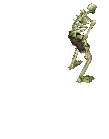About
This seminar engages game culture and technology from the context of humanistic, social science, and technology perspectives. We will explore such issues as the rise of computer game studies, historical approaches to the study of play and gaming, analytical methods for analysis and critique of games, games and art, games and consumerism, game mechanics and interaction paradigms, and game development processes. Each week will involve intensive some combination of reading, viewing, discussion, and play.Required Materials
Readings and Games: Available online for your printing/playing pleasure (see weekly breakdown). You are expected to have the week's reading assignment with you during seminar (hard-copy or computer) for reference purposes.Course Overview
Expectations:- Readings. Readings form the foundation upon which our seminar conversations unfold. A collection of readings has been assembled. However, depending upon where discussions lead, we may find that we want to modify and/or supplement the list.
- Weekly Presentations. Each week 2 students will be responsible for presenting summaries of weekly materials to class. Assignments will be made at our first meeting.
- Questions. Each student will bring at least 2 questions from the materials for that week. Active discussion constitutes 30% of the final grade.
- Games. Games are a primary course material. Concentrated engagement is necessary in order to conduct sound critical analysis. So yes, there will be mandatory playtime.
- Paper/Project. Each student will be expected to complete either: 1) a substantial scholarly paper in the game studies domain (min ~3,500-5,000 words with ~5 scholarly references); or 2) a substantial media project in this area (e.g., a game informed by theoretical work in game studies, a documentary film about an aspect of game culture, a game design document, etc.). Projects must also be written up in a short (min ~1,500-1,800 words), reflective paper. The paper or project constitutes 50% of the final grade.
- Paper/Project presentations. Seminar meetings will be set aside for student presentations of their work during the 9th and 15th week of class. Each presentation will be ~10 minutes long and include prepared materials (conference-style, with slides and/or other media support) followed by brief discussion. The presentation constitutes 20% of the final grade.
Week 01: 01/23 - Intros and Assignments
Week 02: 01/27, 01/30 - Terms
Week 03: 02/03, 02/06 - Terms
Week 04: 02/10, 02/13 - Methods
Week 05: 02/20 - Methods
Week 06: 02/24, 02/27 - Analysis (Early History)
Week 07: 03/03, 03/06 - Analysis (Going Mainstream)
Week 08: Spring Break
Week 09: 03/17, 03/20 - Project Proposals/Presentations
Week 10: 03/24, 03/27 - Analysis/Application/Iteration
Week 11: 03/31, 04/03 - Analysis/Application/Iteration
Week 12: 04/07, 04/10 - Analysis/Application/Iteration
Week 13: 04/14, 04/17 - Analysis/Application/Iteration
Week 14: 04/21, 04/24 - Analysis/Application/Iteration
Week 15: 04/28, 05/01 - Analysis/Application/Iteration
Week 16: 05/05 - Final Class and Project Presentations
Topics
Terms - "Game"Session Leaders: TBD
Read:
- "Nature and Significance of Play as a Cultural Phenomenon," from Homo Ludens: A Study of the Play Element in Culture, Johan Huizinga, 1938 (as reprinted in The Game Design Reader, edited by Katie Salen and Eric Zimmerman).
- "The Definition of Play, the Classification of Games," from Man, Play, and Games, Roger Caillois, 1958 (also as in The Game Design Reader).
Session Leaders: TBD
Read:
- "Culture and Identity," from AS Sociology for AQA, Chris Livesey and Tony Lawson, 2005.
- "Religion as a Cultural System," from The Interpretation of Culture: Selected Essays, Clifford Geertz, 1993.
Session Leaders: TBD
Read:
- "The Question Concerning Technology," from The Question Concerning Technology, Martin Heidegger, 1954, reprinted 1977.
Session Leaders: TBD
Read:
- "Theories of Media," glossary, 2004.
- "What is Ideology," Erik Olin Wright, 2009.
- "Videogames and Ideological Frames," by Ian Bogost, from Popular Communication, Vol 4 No 3, 2006.
Session Leaders: TBD
Read:
- "Scientific Methods and Empiricism," by Mark Davies, class website.
- "Origin of scientific method," by F. Betz, from Managing Science, Springer, 2011.
Session Leaders: TBD
Read:
- Qualitative Research Methods Overview," FHI, from Qualitative Research Methods: A Data Collector's Field Guide, 2005.
- "Descriptive and interpretive approaches to qualitative research," by Robert Elliot and Ladislav Timulak, from A Handbok of Research Methods for Clinical and Health Psychology, 2005
Session Leaders: TBD
Read:
- "Textual Analysis," from Investigating communication: An introduction to research methods, Alyn & Bacon, 1999.
- "Comparative Video Game Criticism," by Ian Bogost, from Games and Culture, Sage Publications, Vol 1, No 1, January 2006.
Session Leaders: TBD
Read:
- "New Media as Material Constraint: An Introduction to Platform Studies," by Ian Bogost, Nick Montfort, from HASTAC proceedings, Duke University 2006.
- platformstudies.com
Session Leaders: TBD
Watch:
- Tennis for Two ca. 1958 (YouTube), Pong ca. 1969 (YouTube)
- Spacewar! ca. 1962 (YouTube, Online Version)
- Colossal Cave Adventure ca. 1972 (YouTube)
Session Leaders: TBD
Watch: Analysis/Application/Iteration
Session Leaders: TBD
Read:
- "Winside Out: An Introduction to the Convergence of Computers, Games, and Art," by Antoinette LaFarge, catalog essay from Shift-Ctrl: Computers, Games, and Art, 2000.
- "SHIFT-CTRL," by Antoinette LaFarge and Robert Nideffer, Leonardo, Vol. 35, No. 1, pp. 5-13, 2002.
Session Leaders: TBD
View:
- "Cracking the Maze: Game Plug-ins and Patches as Hacker Art," by Anne Marie Schleiner Online Exhibition, 1999.
- "Alt-Ctrl: Computers, Games, and Art," curated by Robert Nideffer and Antoinette LaFarge, Beall Center for Art & Technology, UC Irvine, October-November 2004.
Session Leaders: TBD
View: Analysis/Application/Iteration
Session Leaders: TBD
View: Analysis/Application/Iteration
Session Leaders: TBD
View: Analysis/Application/Iteration
Session Leaders: TBD
View: Analysis/Application
Session Leaders: TBD
View:

